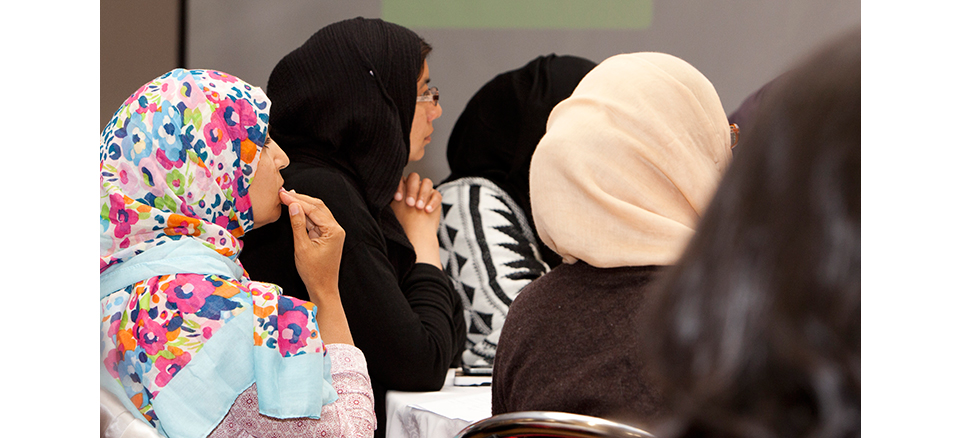Setbacks face government plans for Muslim women learning English

Wed, 23 Nov 2016 10:55:00 GMT
Researcher Dr Royce Turner explores the difficulties facing the policy in a co-authored article in The Political Quarterly
 THE announcement of a £20 million fund to teach English language skills to Muslim women so that they can enter the world of work was met by controversy. But a University of Huddersfield researcher argues that the policy could be a positive development provided that lessons are learned from two major research projects and their valuable findings about the attitudes of ethnic minority women and the challenges they face.
THE announcement of a £20 million fund to teach English language skills to Muslim women so that they can enter the world of work was met by controversy. But a University of Huddersfield researcher argues that the policy could be a positive development provided that lessons are learned from two major research projects and their valuable findings about the attitudes of ethnic minority women and the challenges they face.
Dr Royce Turner (pictured right) – currently a Research Assistant at the University’s Business School – is co-author of a new article and blog written in response to the language fund proposal, made earlier in 2016 by then PM David Cameron, who produced statistics showing 190,000 Muslim women had little or no English and alleged that gender segregation could lead towards radicalisation and extremism. This was followed by Opposition claims that he risked “doing more harm than good”.
The aim of Dr Turner’s article, in leading journal the Political Quarterly, is to alert politicians and policymakers to projects in which he was closely involved when he headed a social research organisation named the Policy Evaluation Group, based in Sheffield.
One was a scheme carried out in 2007 on behalf of the Learning and Skills Council. It took place in areas of West Yorkshire and was one of the largest ever in-depth surveys of Muslim women’s attitudes towards work and their views on life in Britain.
The other was a highly successful 2005/6 Jobcentre Plus initiative in Sheffield that targeted ethnic minority women – mostly Muslim – who faced numerous barriers that kept them out of paid work, including poor English plus objections from family, friend and the community.
In their article, Dr Turner and his co-author and researcher Dr Andrea Wigfield (pictured below) of the University of Sheffield provide detailed accounts of both the projects and appraise their relevance to the new language fund proposal. But they write that there is a real danger that research which is of direct relevance to policy today will “merely gather dust in an archive or, only marginally better, sit unused in cyberspace”.
A positive development
 Dr Turner’s areas of speciality have included research into groups who are marginalised in society and the labour market and how their position can be enhanced. Although there was widespread criticism when Mr Cameron announced the language fund, the new article by Dr Turner and Dr Wigfield concludes that “shorn of its potential punitive elements, a government investment to help women speak English is, in itself, a positive development”.
Dr Turner’s areas of speciality have included research into groups who are marginalised in society and the labour market and how their position can be enhanced. Although there was widespread criticism when Mr Cameron announced the language fund, the new article by Dr Turner and Dr Wigfield concludes that “shorn of its potential punitive elements, a government investment to help women speak English is, in itself, a positive development”.
They argue that “it would help women to develop and enhance their social engagement, should they wish to” and that it would help them to enter the world of paid work, with benefits to the economy as a whole.
“Given the complex and deep-seated barriers to engagement experienced by some Pakistani and Bangladeshi women, and the often all-embracing influence of cultural, societal and familial norms as borne out by the LSC research in West Yorkshire, it is particularly important that policy is designed and implemented in such a way as to maximise its chances of a successful outcome”.
The Learning and Skills Council and JobCentre Plus programmes – which demonstrated a “fruitful outcome” – can lead to an understanding of the barriers, write the authors. In their blog complementing the full Political Quarterly article they summarise the lessons for policy implementation to ensuring success for the new initiative to teach women English.
 They include the need for pro-active recruitment. “You can’t expect women who may have spent decades without any engagement to suddenly start volunteering to sign up. You have to go and find them; let them know what is going on, where”.
They include the need for pro-active recruitment. “You can’t expect women who may have spent decades without any engagement to suddenly start volunteering to sign up. You have to go and find them; let them know what is going on, where”.
It is also important to maintain attendance, again with a pro-active approach, and the language sessions need to be close to home, in “non-threatening” places such as community group venues, “to ensure that participants, who often lack confidence, feel comfortable and, through this, to maximise attendance”.
“The Jobcentre Plus project also recognised the importance of a tailored, individualised approach to helping women. When people are at such a distance from employment, or in the case of the government’s new initiative, at such a distance from fluency in English and social engagement, they cannot be herded as one towards a learning destination”.
In their article the authors conclude that: “The opportunity then, is available to deliver a non-contentious and, potentially, hugely rewarding educational intervention to teach women English… providing it is done in the right way. If it is not, the very least of the discontent that might ensue is a poor return on £20 million of taxpayers’ money”.
- Mr Cameron’s New Language Initiative for Muslim Women: Lessons in Policy Implementation, by Andrea Wigfield and Royce Turner, is in The Political Quarterly, July–September 2016, Volume 87, Issue 3.







